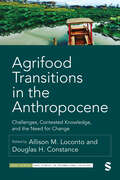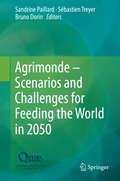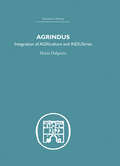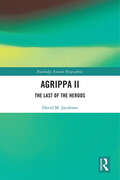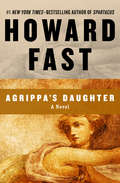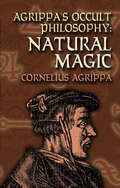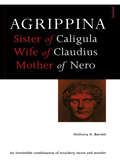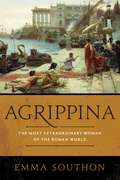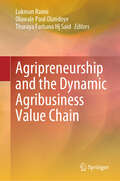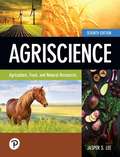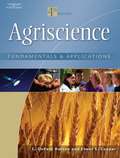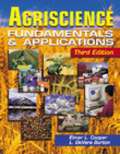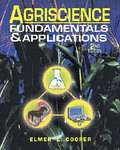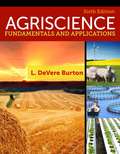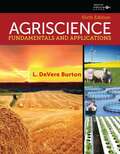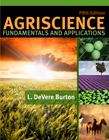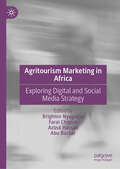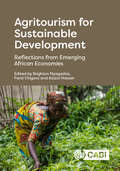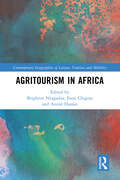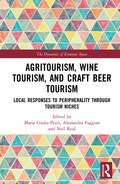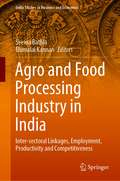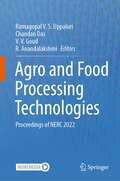- Table View
- List View
Agrifood Transitions in the Anthropocene: Challenges, Contested Knowledge, and the Need for Change (SAGE Studies in International Sociology)
by Douglas H. Constance Allison M. LocontoThe greatest challenges of the twenty-first century stem from the fact that we are now living in a new epoch: the Anthropocene. The human footprint on the planet can no longer be denied. One of the greatest and most essential human innovations, agriculture, is being increasingly recognised as a leading contributor to climate change. According to global governance bodies, the world will need to feed a predicted nine billion people by 2050. However, in this Anthropocene, we must address the environmental inequalities in how these people will be fed. This book explores our current societal struggles to transition towards more sustainable agrifood systems. It suggests that debates around sustainable agriculture must be social as well as technical, exploring the growth of social movements campaigning for more democratic food systems. However, as each chapter demonstrates, both the problems and the solutions in sustainable agriculture are highly contested. Using the term ′agrifood′ to capture the nexus between research, governance and the environment knowledge-environment-governance, this book provides an in-depth and wide-ranging account of current research around agricultural production and food consumption. The book introduces the Anthropocene along with the fundamental question that it poses about human-nature interactions. It outlines the core concerns related to agriculture and food and the debates around the need for agrifood system transitions. Each chapter investigates controversies in the field through case studies. These contributions offer a call for sociologists of agriculture and food to engage with the controversies unfolding in the Anthropocene.
Agrifood Transitions in the Anthropocene: Challenges, Contested Knowledge, and the Need for Change (SAGE Studies in International Sociology)
by Douglas H. Constance Allison M. LocontoThe greatest challenges of the twenty-first century stem from the fact that we are now living in a new epoch: the Anthropocene. The human footprint on the planet can no longer be denied. One of the greatest and most essential human innovations, agriculture, is being increasingly recognised as a leading contributor to climate change. According to global governance bodies, the world will need to feed a predicted nine billion people by 2050. However, in this Anthropocene, we must address the environmental inequalities in how these people will be fed. This book explores our current societal struggles to transition towards more sustainable agrifood systems. It suggests that debates around sustainable agriculture must be social as well as technical, exploring the growth of social movements campaigning for more democratic food systems. However, as each chapter demonstrates, both the problems and the solutions in sustainable agriculture are highly contested. Using the term ′agrifood′ to capture the nexus between research, governance and the environment knowledge-environment-governance, this book provides an in-depth and wide-ranging account of current research around agricultural production and food consumption. The book introduces the Anthropocene along with the fundamental question that it poses about human-nature interactions. It outlines the core concerns related to agriculture and food and the debates around the need for agrifood system transitions. Each chapter investigates controversies in the field through case studies. These contributions offer a call for sociologists of agriculture and food to engage with the controversies unfolding in the Anthropocene.
Agrimonde - Scenarios and Challenges for Feeding the World in 2050: Scenarios And Challenges For Feeding The World In 2050
by Sandrine Paillard Sébastien Treyer Bruno DorinHow will the world be able to feed close to 9 billion people in 2050 and still maintain the ecosystems? In this perspective, INRA and CIRAD launched the initiative, in 2006, to develop a foresight project for analysing issues pertaining to the world's food and agricultural systems on the 2050 timeline. This book provides a synthetic presentation of the main conclusions that this foresight project has yielded. First, it recapitulates the main statistical references for the period 1961 to 2003, before going on to describe the Agribiom simulation tool used to calculate food biomass resource use balances. Two scenarios on the 2050 timeline are then considered: Agrimonde GO is a trend-based scenario that bets on economic growth to feed the world, in a context where environmental protection is not a priority; in contrast, the idea in Agrimonde 1 is to feed the world while preserving its ecosystems.
Agrindus: Integration of AGRIculture and INDUStries
by Haim HalperimThis is a fascinating insight into some of the most important thinking of the industrial revolution in Israel. Technological revolution, rapid industrialization and higher levels of productivity all drew more and more people from the agricultural workforce and new ideas were needed to combat this serious loss of labour. At the time this book was first published, Professor Halperim's had somthing new and original to offer. He argued that agriculture could be combined with industry without undermining that age-old social asset, the village community, and bring it into line with changing conditions. As he predicted the development of areas comprising a score or more of villages, ranging around non-agriculture has been preserved, and rural society has continued to exist although it has assumed different forms. The name proposed by the author for this new formation is Agrindus, as it expresses the integration of AGRiculture and INDUStries.
Agrippa II: The Last of the Herods (Routledge Ancient Biographies)
by David JacobsonAgrippa II is the first comprehensive biography of the last descendant of Herod the Great to rule as a client king of Rome. Agrippa was the last king to assume responsibility for the management of the Temple in Jerusalem, and he ultimately saw its destruction in the Judaean-Roman War. This study documents his life from a childhood spent at the Imperial court in Rome and rise to the position of client king of Rome under Claudius and Nero. It examines his role in the War during which he sided with Rome, and offers fresh insights into his failure to intervene to prevent the destruction of Jerusalem and its Sanctuary, as well as reviewing Agrippa’s encounter with nascent Christianity through his famous interview with the Apostle Paul. Also addressed is the vexed question of the obscurity into which Agrippa II has fallen, in sharp contrast with his sister Berenice, whose intimate relationship with Titus, the heir to the Roman throne, has fired the imagination of writers through the ages. This study also includes appendices surveying the coins issued in the name of Agrippa II and the inscriptions from his reign. This volume will appeal to anyone studying Judaean-Roman relations and the Judaean-Roman War, as well as those working more broadly on Roman client kingship, and Rome’s eastern provinces. It covers topics that continue to attract general interest as well as stirring current scholarly debate.
Agrippa's Daughter: A Novel
by Howard FastAn epic novel of Berenice, Queen of Israel—life, love, and war in the shadow of the Roman Empire—from the New York Times–bestselling author of Spartacus. Throughout her rule in the first century AD, Queen Berenice is idolized by some, and hated by others. Though her fiery red hair makes her instantly recognizable, it is her mysterious charm and steely will that make her unforgettable. The daughter of Israel&’s King Agrippa I, Berenice is determined to free the kingdom of Israel from the shadow of the Roman Empire. But her plans are derailed after her husband, Shimeon, dies during a bloody civil war. When Berenice falls in love with Titus, son of the Roman Emperor, they devise an impossible plan to join the ruling lines of Rome and Israel. A master of gripping historical fiction, Howard Fast brings the ancient world to vivid life in this enthralling, epic drama.This ebook features an illustrated biography of Howard Fast including rare photos from the author&’s estate.
Agrippa's Occult Philosophy: Natural Magic (Dover Books On The Occult Ser.)
by Cornelius AgrippaWritten by a legendary scholar of Renaissance esoterica, this is the single most important text in the history of Western occultism, Cornelius Agrippa (1486-1535) combined classical Neoplatonic and Hermetic philosophy with elements of the Jewish Kabbalah and Christianity to form a systematic exposition of occult knowledge. Agrippa's view of divine order was subsequently eclipsed by the materialism and atheism of the Enlightenment, but 500 years later, his influential work endures as a cornerstone of mystic literature.In serious, educated, and accessible terms, Agrippa defines occultism and magic as a natural means of attaining knowledge and power. His explanations of planetary rulerships, enchantments, sorceries, types of divination, and the interpretation of dreams offer an intriguing array of possibilities: improved health, prolonged life, increased wealth, and enhanced foresight. This inexpensive edition of his classic study offers students of the history of ideas and occult traditions an essential reference tool.
Agrippina: Mother of Nero (Roman Imperial Biographies)
by Anthony A. BarrettIn this dynamic new biography - the first on Agrippina in English - Professor Barrett uses the latest archaeological, numismatic and historical evidence to provide a close and detailed study of her life and career. He shows how Agrippina's political contribution to her time seems in fact to have been positive, and that when she is judged by her achievements she demands admiration. Revealing the true figure behind the propaganda and the political machinations of which she was capable, he assesses the impact of her marriage to the emperor Claudius, on the country and her family. Finally, he exposed her one real failing - her relationship with her son, the monster of her own making to whom, in horrific and violent circumstances, she would eventually fall victim.
Agrippina: The Most Extraordinary Woman Of The Roman World
by Emma SouthonSister of Caligula. Wife of Claudius. Mother of Nero. The story of Agrippina, at the center of imperial power for three generations, is the story of the Julio-Claudia dynasty—and of Rome itself, at its bloody, extravagant, chaotic, ruthless, and political zenith. In her own time, she was recognized as a woman of unparalleled power. Beautiful and intelligent, she was portrayed as alternately a ruthless murderer and helpless victim, the most loving mother and the most powerful woman of the Roman empire, using sex, motherhood, manipulation, and violence to get her way, and single-minded in her pursuit of power for herself and her son, Nero. This book follows Agrippina as a daughter, born in Cologne, to the expected heir to Augustus’s throne; as a sister to Caligula who raped his sisters and showered them with honors until they attempted rebellion against him and were exiled; as a seductive niece and then wife to Claudius who gave her access to near unlimited power; and then as a mother to Nero—who adored her until he had her assassinated. Through senatorial political intrigue, assassination attempts, and exile to a small island, to the heights of imperial power, thrones, and golden cloaks and games and adoration, Agrippina scaled the absolute limits of female power in Rome. Her biography is also the story of the first Roman imperial family—the Julio-Claudians—and of the glory and corruption of the empire itself.
Agripreneurship and the Dynamic Agribusiness Value Chain
by Lukman Raimi Olawale Paul Olatidoye Thuraya Farhana Hj SaidThis book provides an insightful exploration of agribusiness entrepreneurship in the dynamic landscape of the global economy. Targeted at agribusiness researchers, agricultural scientists, finance professionals, and consultants, the thematic focus encompasses agricultural and business entrepreneurship, production and consumption dynamics, ethical considerations, impact investments, and disruptive technologies such as Bitcoin, digital ventures, cryptocurrency, and blockchain. Addressing the principles governing innovative business models, the text delves into the multifaceted realm of entrepreneurship in agriculture, with a specific emphasis on Sustainable Development Goals (SDGs) and the integration of science, technology, engineering, and mathematics (STEM) in agribusiness. The book underscores the pivotal role of agripreneurs in driving agricultural activities, employing mechanization, irrigation, and modern farming technologies to augment production. It navigates the complexities of rural entrepreneurial activity, considering factors like location, natural resources, social capital, and information technologies. Furthermore, the book investigates the necessity for an entrepreneurial culture in agriculture, citing its potential to alleviate challenges, create employment opportunities, curb rural-to-urban migration, and enhance national income. Through a pragmatic lens, it explores the educational processes required for farmers to develop entrepreneurial and organizational skills, emphasizing the significance of such skills in fostering sustainable development. A comprehensive examination of entrepreneurship in agriculture, this book stands as an indispensable resource for those seeking a nuanced understanding of agribusiness dynamics, the integration of innovative technologies, and the role of entrepreneurship in shaping the future of agriculture.
Agriscience (4th Edition)
by Jasper S. Lee Diana L. TurnerAgriScience is a student- and teacher-friendly book that blends physical and biological science with the fundamentals of agriculture. Since agriculture is largely applied science, this is a highly useful and practical approach. Principles of science are presented and reinforced using agricultural applications.
Agriscience: Agriculture, Food, And Natural Resources
by Jasper S. LeeThis book will help you move ahead in learning. With over 25 years since the first edition, and numerous editions since, there is a lot in this book that has been tried and proven. Beginning with the first edition in 1993, emphasis has been on usefulness of the book as a teaching-learning tool. The focus continues to be on approaches that blend science with agriculture, food, and natural resources (AFNR). Students, teachers, parents, agriculturalists, scientists, and many others have provided input that shaped this revised edition. Of course, national, state, and local standards have been used in this process. The goal of the author with this and previous editions has been to produce the best possible book for introductory science-based agricultural education classes. With over a thousand pages, more than 900 illustrations, and 30 carefully designed and written chapters, you are on to something special with this book.
Agriscience: Fundamentals & Applications
by Elmer L. Cooper L. Devere BurtonAgriscience Fundamentals and Applications is the most effective book available for introducing agricultural education. It addresses the full spectrum of the agricultural industry and introduces science as the basis for higher productivity and for the safest food system in the world. Readers also gain knowledge about agricultural careers and opportunities through the Agri-Profile feature. The authors successfully convey the principles of integrating science into the agricultural curriculum, and they educate readers about accessing related material on the Internet and about National FFA programs related to agriscience and technology. Color photos and illustrations, discussions of recent technological advances and Hot Topic inserts are just some of the many tools used to help the reader comprehend the wealth of material contained in this introduction to agriscience.
Agriscience: Fundamentals And Applications (3rd edition)
by Elmer L. Cooper L. Devere BurtonThis third edition of "Agriscience: Fundamentals & Applications," addresses the basic levels of modern agriscience concepts using language and examples designed to meet the needs of beginning students interested in natural science careers. The text integrates broadened principles of agriculture through all the major science areas, and adds many new applications of science, technology, math, agriculture, natural resources and the environment. New full-color photographs and illustrations have been added for visual enhancement, as well as internet icons to help students explore agriscience topics beyond the boundaries of the text. The unit profiles and student activities provide instructors with innovative ways to teach modern agriscience concepts, as this book contains invaluable resources for introductory agriscience curriculums.
Agriscience: Fundamentals and Applications
by Elmer L. CooperPatterned after FFA-endorsed curricula, this best-selling full-color text integrates basic biological and technological concepts with principles of production agriculture. It carefully takes students through all major science areas from plant and animal sciences, to food science, to environmental technology. The Second Edition features several new Agri-profiles of hi-tech agricultural careers, as well as the latest information on integrated pest management, agribusiness, and natural resource management. Stocked with pedagogical aids, such as performance-based objectives, terms-to-know, chapter-ending reviews, and objective, essay, and review questions, as well as a complete supplement package, this edition provides the tools needed to plan and implement a successful introductory Agriscience program. (plant and animal science, science of living things, biotechnology, natural resource management, hydroponics management)
Agriscience: Fundamentals and Applications
by L. DeVere BurtonComprehensive, yet easy to understand, AGRISCIENCE FUNDAMENTALS AND APPLICATIONS, Sixth Edition provides readers with an overview of the agricultural industry and the industry-based sciences. With coverage of topics such as the information age, natural resources, integrated pest management, plant sciences (including botany, crops, & ornamentals), animal science, food science, and communication and management, this introductory applied science book ensures that readers will develop a solid foundation in the basic principles and practices of agriscience. In addition to the extensive learning tools found in each chapter, the sixth edition now includes updated visual aids, glossary, and science and agricultural profiles.
Agriscience: Fundamentals and Applications
by L. Devere BurtonAgriscience Fundamentals and Applications, 5th edition provides a broad-spectrum overview of the agricultural industry and the industry-based sciences, including basic principles of science as they apply to plants, animals, soils and foods, for high school students. Each chapter includes visual aids such as color photos, sketches, diagrams, and tables. Agriscience Fundamentals and Applications, 5th edition, also identifies chapter objectives, evaluation materials, suggested class activities, key terms, and internet key words to guide student's in-depth study.
Agritech: Thermal and Non-Thermal Processing
by Nick Serpone Satoshi Horikoshi Graham Brodie Koichi TakakiThis book describes innovative agricultural methods using thermal and non-thermal microwave or plasma energies. Humans that were nomadic in the past can now stably obtain food by developing agriculture. Cities were formed as a result of remarkable development. Later, chemicals were introduced to agriculture to stabilize the food supply further. Natural products were initially used, but various artificial compounds have been developed for agriculture since the 1900s. To further improve crop productivity and diversification, gene recombination (genetic engineering) using biotechnology has progressed in recent years and continues to develop further. However, these technologies contain pesticide residues and pose safety risks. The innovative new agriculture explained in this book is based on the use of microwaves and plasma that do not rely on chemicals and genetic modification. This is one of the first books focusing on the agricultural usage of microwaves. In addition, it is a technical book that incorporates plasma into agriculture from this perspective. The book covers microwaves and plasmas, which are completely different fields. Thus, it will be attractive to many readers who want to acquaint themselves with these alternative technologies and implement them. This book will be useful to a broad audience including researchers and technicians at Universities and practitioners in industries. It is made accessible to readers across different fields by including abundant figures and by limiting the use of equations to the possible extent.
Agritourism Marketing in Africa: Exploring Digital and Social Media Strategy
by Azizul Hassan Brighton Nyagadza Farai Chigora Abu BasharThis edited volume takes a multi-faceted approach, giving readers insights into the role of digital and social media marketing in the agritourism industry in Africa. Each chapter provides some theoretical, policy and practical implications for policy makers, educational practitioners, students and business communities on how agritourism’s digital and social media marketing strategies could be of benefit to them. It considers macro, micro and firm-level analyses relating to how agritourism digital and social media marketing could be harnessed to fuel tourism corporate brands development in under-researched African contexts. Its empirical case studies provide scientific evidence-based approaches that inform understanding on the contribution of these antecedents to the realisation of tourism corporate brands development. The book balances theory and experimentation, providing a thorough explication of the tools and techniques of agritourism digital and social media marketing, marketing, corporate communications and corporate reputation management relevant to the tourism and agricultural organisations in the African continent in particular, and the globe at large. As we reach the point of no return in our destruction of the planet, we need to look at global solutions to ‘reverse the traditional thinking’ (by applying frugal transformative futuristic solutions) of putting economy before green ecological balance and instead look to new ways of changing our appetite for wealth to fit within the ecological cycles which naturally exist.
Agritourism for Sustainable Development: Reflections from Emerging African Economies
by Dumisani Rumbidzai Muzira Ernest Mugoni Jabulani Garwi Admire Mthombeni Bronson Mutanda Collen Sabao Dzingai Kennedy Nyahunzvi Edward Chinongwa Enard Mutenheri Felix Chari Geoffrey Korir Gilda Eyang Gracious Mutipforo Hellen Amunga Judith Moyo Katsande Chipo Martin Dzapasi Noreen Watyoka Nyasha Tendai Makiwa Lucyna Przezborska-Skobiej Komborerai Wilfred Chikwape Obert Sifile Ranganayi Njodzi Raymond Mapuranga Regis Muchowe Samulo Mutale Sharon Chisango Shingirai Siziba Solomon Marime Tendai Shelton Muwani Tichakunda Valentine Chabata Willard Muntanga Yeukayi Dzapasi Zibanai ZhouThrough the lens of African emerging economies, this text examines empirical studies and the related practices of agritourism. By looking at tourism innovation, entrepreneurship ethics and responsibility of public and private organizational stakeholders, the text promotes an understanding of how radical novel sustainable agritourism might be implemented to help society's living become more sustainable with low usage of material resources, low energy and environmental cost. Informed by the 2030 Agenda for Sustainable Development and Sustainable Development Goals (SDGs) framework, which emphasize the fostering of novel sustainable agritourism, the book includes: methodologies, theory, reviews, primary research findings and practice topics such as start-ups, legal aspects, CSR and digital technologies techniques and tools with global application The book will be of interest to academics and postgraduate students interested in the challenges of sustainable agritourism and African emerging economies.
Agritourism in Africa (ISSN)
by Azizul Hassan Brighton Nyagadza Farai ChigoraThis insightful, timely and multi-faceted book offers significant insight into the role and complex dynamics of agritourism in Africa.Logically structured, data-led and richly illustrated throughout, chapters provide theoretical, policy and practical implications on the successes and challenges of achieving sustainable agritourism destinations, with an emphasis on technology, that not only grows African economies, but offers work opportunities, increased social empowerment and diversity. Based on empirical research, the volume covers a wide range of topics relating to agritourism in Africa, elucidated through inclusion of case studies and examples from around the continent, including Ghana, Angola and Nigeria. Topics covered include discussion of the features required for a successful agritourism business, the impact of social media and digital marketing on new agritourism destinations.This volume will be of pivotal interest to students, researchers and scholars of Tourism, African Studies and Development Studies.
Agritourism, Wine Tourism, and Craft Beer Tourism: Local Responses to Peripherality Through Tourism Niches (The Dynamics of Economic Space)
by Maria Giulia PezziThis book delves into the development opportunities for peripheral areas explored through the emerging practices of agritourism, wine tourism, and craft beer tourism. It celebrates the entrepreneurial spirit of people living in peri-urban regions.Peripheral areas tend to be far from urban hubs, providing essential services but also typically suffering from marginalisation and remoteness, despite the access to environmental, cultural, and social resources. In this sense, this book investigates the linkages between local agency and tourism in peripheral areas, the role of existing policies, and the evolving bottom-up practices in fostering local development. The basic aim is to disestablish the dichotomies that often emerge when dealing with issues of rural–urban and/or centre–periphery relationships; innovation vs tradition; authenticity vs mise en scène; agency vs inertia; and social, cultural, economic mobility vs immobility; etc. With focused attention on the possible compliance or conflicting strategies of local actors with the existing policies, the book considers how local actors and communities respond to the implications of peripherality in areas often impacted by marginalising processes.Drawing upon case studies from North America and Europe, this book presents this connection as a global phenomenon which will be of interest to community and economic development planners and entrepreneurs.
Agro and Food Processing Industry in India: Inter-sectoral Linkages, Employment, Productivity and Competitiveness (India Studies in Business and Economics)
by Seema Bathla Elumalai KannanThis book provides different facets of India's agro and food processing industry in both organised and unorganised segments. It brings forth the topical issues having potential to accelerate the pace of growth in its employment, investment and productivity and strive for improving the global competitiveness. Using advanced quantitative techniques, it brings new evidences on inter-sectoral (agriculture-industry-services) employment and production linkages, contractual arrangements through Farmer Producer Companies, and subcontracting in the processed food sector. It also throws light on India's comparative advantage in export of primary and processed food products.With rising per capita income, urbanisation, and changing food habits of people, India is increasingly striving to improve productivity and competitiveness in agriculture and manufacturing. A concerted policy focus to accelerate private investment in food processing, largely viewed as a sunrise industry, is expected to contribute to large scale job creation and external trade not only in the manufacturing but also in the agricultural sector. Keeping this in mind, considerable insights are featured in the book at the industry and firm levels due to a significant bearing of technological, tariffs and non-tariff barriers and labour regulations on their trade intensity, employment and efficiency. Containing perspectives from the top agriculture and industry economists in the country, the book will be very useful to researchers, academicians, trade analysts and policy makers.
Agro and Food Processing Technologies: Proceedings of NERC 2022
by Chandan Das Ramagopal V. S. Uppaluri V. V. Goud R. AnandalakshmiThis book focuses on sustainable agro and food technologies for the northeast region of India and provides holistic insights into relevant and contextual scientific and technical advances in the agro-food sector. Agriculture is an important livelihood avenue for many residents of northeast India. Low-cost scientific and technological intervention can transform agricultural farm produces and generate farm waste into processed value-added products. This book will serve as a valuable resource to further enhance the linkage between managerial aspects and technological knowledge systems in this field and eventually catalyse potential knowledge frameworks for the long-term prosperity and sustainability of bio-diversity-rich North-east India. It emphasizes the research culture that needs to be adopted for the most relevant food and agro-processing technologies for the sustainable growth and prosperity of the region.
